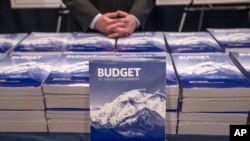U.S. President Barack Obama unveiled a $4.1 trillion spending plan Tuesday for the fiscal year that starts next October, but the Republican-controlled Congress is already signaling it will ignore many of his new initiatives during his last year in office.
In a presidential election year to pick his successor, the Democratic president proposed programs sure to appeal to supporters of the eventual Democratic presidential nominee and likely opposed, at least in part, by the Republican candidate.
Obama's fiscal 2017 budget, up 5 percent from the current year, calls for increased spending to fight Islamic State insurgents across the Middle East, a $10-per-barrel tax on crude oil to fund "clean" transportation projects, a new research initiative to cure cancer and more financial aid for low-income college students.
Obama wants $7.5 billion to fight Islamic State, a 50 percent increase that includes money to pay for more than 45,000 GPS-guided smart bombs.
Diplomacy
Obama is also seeking $50.1 billion for the upcoming fiscal year to support diplomatic and aid efforts that would advance security and confront new threats around the globe, including resources to fight extremism, a senior U.S. State Department official said Tuesday.
“This one percent of the federal budget supports some of our nation's most critical efforts to advance the safety, values and prosperity of the American people, and we are committed to efficient and effective use of these resources,” said Deputy Secretary Heather Higginbottom, adding America’s leadership must be “backed by resources.”
The proposed $50.1 billion allocation includes a base request of $35.2 billion to support ongoing and emerging national security challenges, and another $14.9 billion for overseas contingency operations, to respond to immediate and extraordinary national security requirements, including global health crises, like the Zika virus.
The State Department said the new budget request is aligned with a bipartisan budget agreement signed into law last fall, which sets spending levels for fiscal years 2016 and 2017.
Anticipating modest economic growth
The budget would also continue the country's chronic annual budget deficit, projected at $503 billion next year compared to $616 billion this year. Both figures are well off the $1.4 trillion figure in 2009, Obama's first year in office during the country's steepest recession since the Great Depression of the 1930's.
Obama said his 2017 plan "makes critical investments while adhering to the bipartisan budget agreement I signed into law last fall."
The Republican leader of the House of Representatives, Speaker Paul Ryan, attacked the proposal, saying, "President Obama will leave office having never proposed a budget that balances -- ever. This isn't even a budget so much as it is a progressive manual for growing the federal government at the expense of hardworking Americans."
Obama's spending plan envisions only a modest U.S. economic advance this year and next in the world's largest economy, about 2.6 percent in both years, but the White House said in the budget, "The United States right now has the strongest, most durable economy in the world."
Obama's oil tax would come at a time of very low prices on the world oil market - about $30 a barrel.
"Some of that revenue can be used for transportation, some of that revenue can be used for the investments in basic research and technology that's going to be needed for the energy sources of the future," Obama said in announcing his proposal. "Then 10 years from now, 15 years from now, 20 years from now, we're going to be in a much stronger position when oil starts getting tight again, prices start going up again."
Republican rejection
New oil taxes have routinely been rejected by the Republican-controlled Congress, where Obama's opponents are also rejecting his latest government spending plans, much as they have rebuffed calls in earlier years for higher taxes on wealthy Americans and new fees on big banks.
Already, Republican lawmakers have taken the unusual step of refusing to invite the White House budget director, Shaun Donovan, to testify about the 2017 budget.
White House spokesman Josh Earnest accused the Republican lawmakers of "taking the Donald Trump approach to debates about the budget," referring to the front-running Republican presidential candidate refusing to show up at one of his party's candidate debates last month.
Congressman Tom Price, chairman of the House of Representatives' budget committee, said Republicans will draft their own spending plan, "rather than spend time on a proposal that, if anything like this administration's previous budgets, will double down on the same failed policies."




